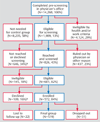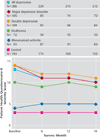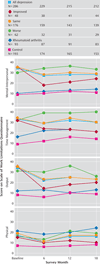Job performance deficits due to depression
- PMID: 16946182
- PMCID: PMC4269259
- DOI: 10.1176/ajp.2006.163.9.1569
Job performance deficits due to depression
Abstract
Objective: This study assessed the relationship between depression severity and job performance among employed primary care patients.
Method: In a 2001-2004 longitudinal observational study of depression's affect on work productivity, 286 patients with DSM-IV major depressive disorder and/or dysthymia were compared to 93 individuals with rheumatoid arthritis, a condition associated with work disability, and 193 depression-free healthy control subjects. Participants were employed at least 15 hours per week, did not plan to stop working, and had no major medical comorbidities. Measures at baseline, six, 12, and 18 months included the Work Limitations Questionnaire for work outcomes, and the Patient Health Questionnaire-9 for depression.
Results: At baseline and each follow-up, the depression group had significantly greater deficits in managing mental-interpersonal, time, and output tasks, as measured by the Work Limitations Questionnaire: The rheumatoid arthritis group's deficits in managing physical job demands surpassed those of either the depression or comparison groups. Improvements in job performance were predicted by symptom severity. However, the job performance of even the "clinically improved" subset of depressed patients remained consistently worse than the control groups.
Conclusions: Multiple dimensions of job performance are impaired by depression. This impact persisted after symptoms have improved. Efforts to reduce work-impairment secondary to depression are needed.
Figures



Comment in
-
Mood disorders and workplace performance: half a loaf.Am J Psychiatry. 2006 Sep;163(9):1490-1. doi: 10.1176/ajp.2006.163.9.1490. Am J Psychiatry. 2006. PMID: 16946170 No abstract available.
References
-
- Berndt ER, Finkelstein SN, Greenberg PE, Howland RH, Keith A, Rush AJ, Russell J, Keller MB. Workplace performance effects from chronic depression and its treatment. J Health Econ. 1998;17:511–535. - PubMed
-
- Broadhead WE, Blazer DG, George LK, Tse CK. Depression, disability days, and days lost from work in a prospective epidemiologic survey. JAMA. 1990;264:2524–2528. - PubMed
-
- Goetzel RZ, Hawkins K, Ozminkowski RJ, Wang S. The health and productivity cost burden of the “top 10” physical and mental health conditions affecting six large U.S. employers in 1999. J Occup Environ Med. 2003;45:5–14. - PubMed
-
- Kessler RC, Barber C, Birnbaum HG, Frank RG, Greenberg PE, Rose RM, Simon GE, Wang P. Depression in the workplace: effects on short-term disability. Health Aff. 1999;18:163–171. - PubMed
-
- Kessler RC, Greenberg P, Mickelson K, Meneades LM, Wang PS. The effects of chronic medical conditions on work loss and work cutback. J Occup Environ Med. 2001;43:218–225. - PubMed
Publication types
MeSH terms
Grants and funding
LinkOut - more resources
Full Text Sources

